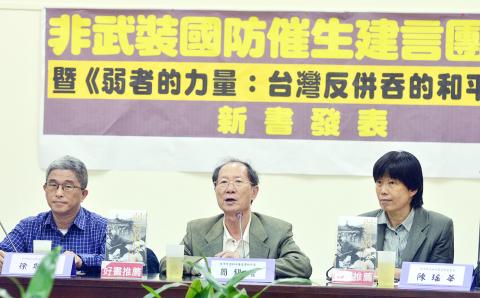Taiwan should develop a national defense strategy that incorporates nonviolent civil resistance in the event of a Chinese invasion, former Democratic Progressive Party (DPP) legislator Chien Hsi-chieh says in a new book, titled Power of the Weak (弱者的力量).
Chien, a long-time labor activist and expert in nonviolent resistance tactics, said the nation should establish a system of “nonviolent, civilian-based defense” that would coexist with military forces and act to paralyze a foreign authoritarian regime.
The strategy would require the entire population to receive education and training in civil disobedience tactics, with the government serving as a coordinator in sharing the experience of social activist groups with the rest of the public, he said.

Photo: Wang Yi-sung, Taipei Times
Nonviolent resistance is an urgent issue given the growing imbalance in military power between Taiwan and China and the increasing possibility the that the US might “abandon” Taiwan in the case of military conflict.
By adopting nonviolent methods, the public could claim a moral higher ground and create more international pressure on an invading regime, Chien said.
“We should apply methods of non-cooperation and disobedience to resist the annexation of Taiwan by the Chinese Communist Party regime,” Chien said.
Accompanied by representatives of activist groups at a Taipei news conference, Chien said he plans to lobby for legislation on the issue as well as seek support from all candidates running in next year’s presidential elections.
Taiwan could learn from the experiences of Lithuania or other Baltic states, which include both military security and civil resistance as part of their national defense strategy, Chien said.
In his book, Chien said that Lithuania’s strategy was largely inspired by its independence movement against the Soviet Union from 1988 to 1991, in which the entire public took part in coordinated actions of civil disobedience such as mass strikes, road blockades and passive resistance to Soviet laws.
Many other countries, such as Norway, Sweden, Denmark, Austria, the Netherlands and South Africa, also include similar principles in their national defense strategies, Chien said.
Academia Sinica researcher Hsu Szu-chien (徐斯儉) said he agreed with Chien’s view that civil resistance should not only be seen as a supplement to military force, but as a “powerful backing” for national defense.
Hzu said neighborhoods and communities should get involved in grassroots action in defense, disaster relief and social welfare.
“Instead of ‘national defense,’ we might put it as ‘community defense;’ in case of such a scenario, individual communities could declare themselves to be ‘non-cooperative communities,’” Hsu said.

Alain Robert, known as the "French Spider-Man," praised Alex Honnold as exceptionally well-prepared after the US climber completed a free solo ascent of Taipei 101 yesterday. Robert said Honnold's ascent of the 508m-tall skyscraper in just more than one-and-a-half hours without using safety ropes or equipment was a remarkable achievement. "This is my life," he said in an interview conducted in French, adding that he liked the feeling of being "on the edge of danger." The 63-year-old Frenchman climbed Taipei 101 using ropes in December 2004, taking about four hours to reach the top. On a one-to-10 scale of difficulty, Robert said Taipei 101

Nipah virus infection is to be officially listed as a category 5 notifiable infectious disease in Taiwan in March, while clinical treatment guidelines are being formulated, the Centers for Disease Control (CDC) said yesterday. With Nipah infections being reported in other countries and considering its relatively high fatality rate, the centers on Jan. 16 announced that it would be listed as a notifiable infectious disease to bolster the nation’s systematic early warning system and increase public awareness, the CDC said. Bangladesh reported four fatal cases last year in separate districts, with three linked to raw date palm sap consumption, CDC Epidemic Intelligence

US climber Alex Honnold left Taiwan this morning a day after completing a free-solo ascent of Taipei 101, a feat that drew cheers from onlookers and gained widespread international attention. Honnold yesterday scaled the 101-story skyscraper without a rope or safety harness. The climb — the highest urban free-solo ascent ever attempted — took just more than 90 minutes and was streamed live on Netflix. It was covered by major international news outlets including CNN, the New York Times, the Guardian and the Wall Street Journal. As Honnold prepared to leave Taiwan today, he attracted a crowd when he and his wife, Sanni,

Taiwanese and US defense groups are collaborating to introduce deployable, semi-autonomous manufacturing systems for drones and components in a boost to the nation’s supply chain resilience. Taiwan’s G-Tech Optroelectronics Corp subsidiary GTOC and the US’ Aerkomm Inc on Friday announced an agreement with fellow US-based Firestorm Lab to adopt the latter’s xCell, a technology featuring 3D printers fitted in 6.1m container units. The systems enable aerial platforms and parts to be produced in high volumes from dispersed nodes capable of rapid redeployment, to minimize the risk of enemy strikes and to meet field requirements, they said. Firestorm chief technology officer Ian Muceus said